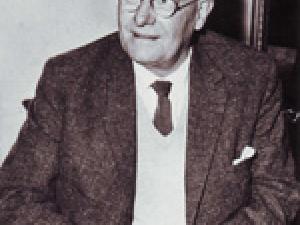Lord Howard Walter Florey (1898-1968)
Lord Howard Walter Florey
Born in Malvern, Adelaide, Florey was educated at St Peter’s College and the University of Adelaide (MB, BS, 1921; MD, 1944). He sailed for England in 1921 as a Rhodes scholar.
At the University of Oxford he studied in the honour school of physiology under Sir Charles Sherrington, and in 1924 transferred to the University of Cambridge. In 1925 he spent ten months in the United States of America, after which he worked in London.
From 1927 Florey lectured in pathology at Cambridge, working also on his doctoral thesis on the flow of blood and lymph. In 1931 he was appointed professor of pathology at the University of Sheffield, and four years later moved to a similar post in Oxford. He remained in this position until 1962 when he moved to become provost of The Queen's College.
Florey’s greatest contribution was the development of penicillin as a systemic antibacterial agent, so inaugurating the antibiotic era. In 1938 Florey and (Sir) Ernst Chain initiated an investigation of the biological and biochemical properties of antibacterial substances produced by bacteria and fungi. They selected penicillin, discovered by Fleming in 1928, for detailed examination. Despite the difficulties in wartime Britain, Florey’s team produced enough penicillin to carry out clinical trials in 1941, and the results were dramatic. The wartime demand was immense, but the British pharmaceutical industry was inadequate to the task; penicillin was first produced commercially in the United States of America. Its effects were miraculous.
Despite living in Britain since the age of 23, Florey remained Australian in accent and outlook, and his presence in Oxford led to a succession of young Australians undertaking postgraduate study in his department. In 1926 he married Mary Ethel Hayter Reed, whom he had met while they were students at the University of Adelaide.
In 1944 Florey visited Australia to discuss the local production of penicillin and to report on the state of medical research in this country. He produced a paper that played a major role in establishing the Australian National University, and from 1947 to 1957 he was closely connected with the development of the University, particularly of the John Curtin School of Medical Research. He declined the offer of school directorship, but he opened the school's first permanent building in 1958, and became chancellor of the ANU in 1965.
Florey was elected a fellow of the Royal Society in 1941, and served as an outstanding president from 1960 to 1965, during which time he reorganised the Society, greatly expanded its research-professorship programme, and secured magnificent new premises in Carlton House Terrace.
He was knighted in 1944, and, with Chain and Fleming, won the Nobel prize for physiology and medicine in 1945. He was appointed to the French Légion d'Honneur in 1946, and was awarded the USA's Medal of Merit in 1948. In 1965 he was created Baron Florey of Adelaide and Marston, and the same year was appointed to the Order of Merit.
A suburb in Canberra is named after him, and a bronze head of Florey by John Dowie is displayed on North Terrace, Adelaide. The statue was unveiled by the Right Honourable Lord Mayor, Robert E. Porter, 25th June 1967.

